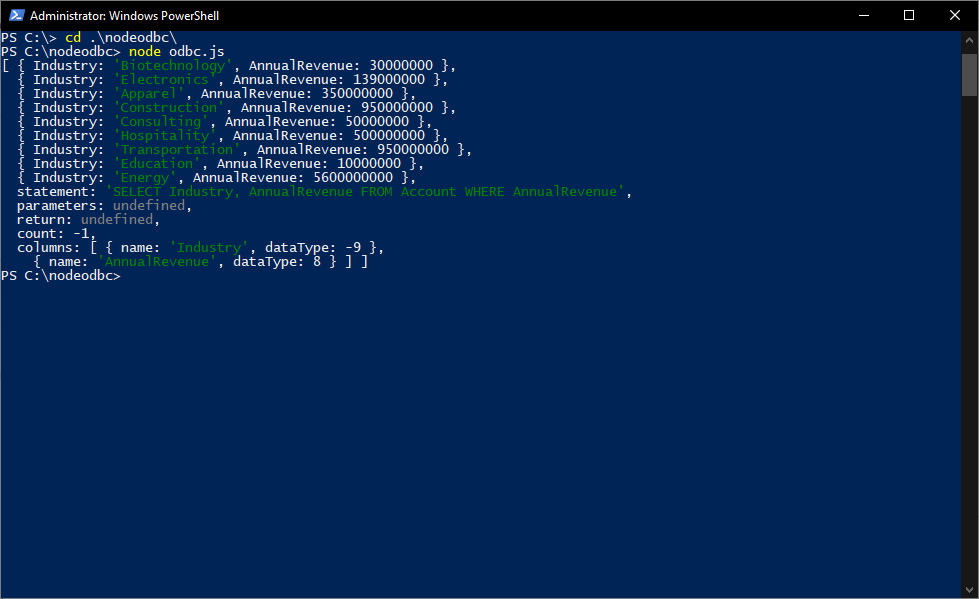Discover how a bimodal integration strategy can address the major data management challenges facing your organization today.
Get the Report →Query Databricks Data through ODBC in Node.js
Use node-odbc to execute SQL queries against Databricks data from Node.js.
Node.js is a JavaScript runtime environment that allows you to run JavaScript code outside of a browser. With the CData ODBC Driver for Databricks, you can access live Databricks data from Node.js apps and scripts. In this article, we walk through installing node-odbc and the required tools to create a simple Node.js app with access to live Databricks data.
With built-in optimized data processing, the CData ODBC Driver offers unmatched performance for interacting with live Databricks data in Node.js. When you issue complex SQL queries from Node.js to Databricks, the driver pushes supported SQL operations, like filters and aggregations, directly to Databricks and utilizes the embedded SQL engine to process unsupported operations client-side (often SQL functions and JOIN operations).
About Databricks Data Integration
Accessing and integrating live data from Databricks has never been easier with CData. Customers rely on CData connectivity to:
- Access all versions of Databricks from Runtime Versions 9.1 - 13.X to both the Pro and Classic Databricks SQL versions.
- Leave Databricks in their preferred environment thanks to compatibility with any hosting solution.
- Secure authenticate in a variety of ways, including personal access token, Azure Service Principal, and Azure AD.
- Upload data to Databricks using Databricks File System, Azure Blog Storage, and AWS S3 Storage.
While many customers are using CData's solutions to migrate data from different systems into their Databricks data lakehouse, several customers use our live connectivity solutions to federate connectivity between their databases and Databricks. These customers are using SQL Server Linked Servers or Polybase to get live access to Databricks from within their existing RDBMs.
Read more about common Databricks use-cases and how CData's solutions help solve data problems in our blog: What is Databricks Used For? 6 Use Cases.
Getting Started
Connecting to Databricks Data
If you have not already done so, provide values for the required connection properties in the data source name (DSN). You can use the built-in Microsoft ODBC Data Source Administrator to configure the DSN. This is also the last step of the driver installation. See the "Getting Started" chapter in the help documentation for a guide to using the Microsoft ODBC Data Source Administrator to create and configure a DSN.
To connect to a Databricks cluster, set the properties as described below.
Note: The needed values can be found in your Databricks instance by navigating to Clusters, and selecting the desired cluster, and selecting the JDBC/ODBC tab under Advanced Options.
- Server: Set to the Server Hostname of your Databricks cluster.
- HTTPPath: Set to the HTTP Path of your Databricks cluster.
- Token: Set to your personal access token (this value can be obtained by navigating to the User Settings page of your Databricks instance and selecting the Access Tokens tab).
Building node-odbc
In order to connect to Databricks through the CData ODBC Driver, you need to build node-odbc manually (after installing the required tools).
Installing the Required Tools
The following commands install the tools required to build node-odbc (note the -g parameter, which installs the tools globally).
npm i -g windows-build-tools npm i -g node-gyp
Building node-odbc
After installing the required tools, create a directory for the Node.js app and install odbc (which builds the binary for us to use in our Node.js script).
mkdir nodeodbc cd nodeodbc npm i -g node
Querying Databricks from Node.js
With the ODBC Driver installed, a DSN Configured, and node-odbc built, we are ready to query live Databricks data from a Node.js app. The sample code below connects to a specific DSN and queries the Customers table.
myscript.js
const odbc = require('odbc');
async function queryDatabricks() {
const connection = await odbc.connect(`DSN=CData Databricks Source`);
const data = await connection.query('SELECT City, CompanyName FROM Customers');
console.log(data);
}
queryDatabricks();
Once you write the app, use node to execute the script:
node myscript.js

Download a free, 30-day trial of the CData ODBC Driver for Databricks and start working with your live Databricks data in Node.js. Reach out to our Support Team if you have any questions.





